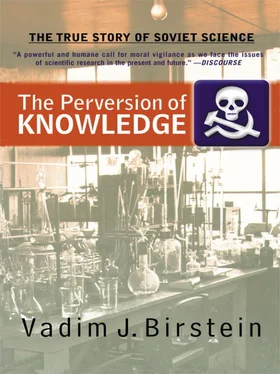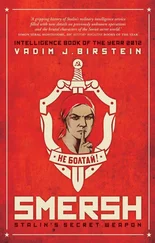Yakovleva, Varvara(1884–1941?), Party figure. Joined the Bolshevik Party in 1904. In exile to Siberia in 1910 and 1913. Took part in the revolutions in Moscow in 1905 and 1917. In Moscow CheKa and a member of the VCheKa Presidium (1918), deputy chair, then chair of the Petrograd VCheKa (1918–1919), secretary of the Moscow Bureau of the Bolshevik Party (1920–1922). Thereafter, at different governmental and Party positions. Follower of Trotsky until 1926. In March 1938, a witness at the Bukharin show trial. Later arrested, tried, and died in a labor camp (Leggett, The CHEKA , p. 450; Conquest, The Great Terror , p. 134).
Yakushkin, Ivan(1885–1960), botanist. From 1932, head of the Plant Department at the Timiryazev Agricultural Academy. Member of the Agricultural Academy (1935). A secret informer of the NKVD/MGB. Was used as a head of the NKVD commission of experts that denounced Vavilov.
Yanshin, Aleksandr(1911–), geologist and geographer. Academician (1958). Vice president of the academy responsible for the Earth Sciences Division (1982–1988), director of the Institute of Lithosphere, president of Moscow Society of Naturalists, head of the Academy Scientific Council on the Problems of Biosphere (from 1982).
Yenukidze, Avel(1877–1937), Party and state figure, a personal friend of Stalin. Secretary of the Central Executive Committee and chair of the Politburo’s Commission on Assistance to the Work of the Academy of Sciences (1925–1929), a member of the Central Committee (1934–1935). Expelled from the Party in 1935 and demoted to a low-level job in the city of Kharkov. Arrested on February 11, 1937, sentenced to death on October 30, 1937, and shot the next day. Rehabilitated in 1959 (Tikhanova, Rasstrel’nye spiski , p. 150).
Yepishev, Aleksei(1908–1985), MGB and military figure. Deputy MGB minister for cadres (1951–1953), ambassador to Romania (1955–1960), then to Bulgaria (1960–1962), head of the Main Political Directorate of the Soviet army and navy (1962–1985) (Naumov and Sigachev, Lavrentii Beria , p. 442).
Zakovsky( Stubis) , Leonid(or Genrikh) (1894–1938) joined the VCheKa in 1918, at different regional OGPU/NKVD branches. deputy NKVD commissar (January–April 1938). Arrested on April 30, 1938, tried and shot on August 29, 1938. Not rehabilitated (Petrov and Skorkin, Kto rukovodil NKVD , p. 199).
Zarubin, Vasilii(1894–1972) joined the VCheKa in 1921, sent to China. From the 1920s–1930s, in Germany, France, Denmark, and Switzerland. The NKVD/NKGB rezident in the United States under the alias “Zubilin” (1941–1944), played a key role in collecting information on the Manhattan Project. Recalled to Moscow to face a false accusation of working for the Germans. Deputy head of Foreign Intelligence (from 1944). In 1948, transferred to the reserve for health reasons (Voskresenskaya, Pod psevdonimom Irina , pp. 56–57, 259–266; Trubnikov, Ocherki , pp. 203–215; Haynes and Klehr, Venona , p. 394).
Zavenyagin, Avraamii(1901–1956), Party and state figure. Joined the Party in 1917. Director of a truck/car plant in the city of Dneprodzerzhinsk (1932–1933), of the Magnitogorsk Industrial Complex (1933–1937), deputy commissar of heavy industry (1937–1938), director of the Norilsk Industrial Complex and commandant of the labor camp for prisoners who built and worked at this plant (1938–1941), deputy Narkom/minister of the NKVD/MVD (1941–1951), deputy head of the First Main Directorate under the Council of Ministers, i.e., of the Soviet A-bomb project (1945–1953), deputy minister (1953–1955), and then minister of medium machine building, (i.e., of atomic energy) (1955–1956). Hero of Socialist Labor (1949, 1951) (Kokurin and Petrov, Lubyanka , p. 147).
Zbarsky, Boris(1885–1954), biochemist. Graduated from Geneva University and St. Petersburg University. Assisted in the organization of the Karpov Chemical Institute (1918) and the Bach Institute of Biochemistry (1920), acting director of both institutes until 1930. Joined the Communist Party in 1930. From 1933, chaired the Biochemistry Department of the Moscow First Medical Institute, and from 1939, head of the Laboratory on the Preservation of Lenin’s body. In 1937 was among those doctors who denounced Dr. Dmitri Pletnev. Arrested in February 1952 as an alleged member of the Doctors’ Plot. Released in December 1953. Died in October 1954 from a heart attack in the middle of a lecture.
Zenkevich, Lev(1889–1970), invertebrate zoologist. Academician and deputy secretary academician of the Academy Division of Oceanology, Atmosphere Physics, and Geography. Also chaired the Department of Invertebrate Zoology at the Biological Faculty of Moscow State University.
Zhdanov, Andrei(1896–1948), Party figure, the leading Party ideologist of the 1940s. Different posts from 1922–1934. First secretary of the Leningrad Regional and City Committees (1934–1944), secretary of the Central Committee (1934–1946), Politburo member (1939–1948), member of Military Councils (1941–1945). Chair of the Union Council of the Supreme Soviet (1946–1947). Played an important role in Trofim Lysenko’s triumph in 1948. Supposedly was killed by Jewish doctor-killers (Naumov and Sigachev, Lavrentii Beria , p. 444; Hahn, Postwar Soviet Politics , pp. 19–66, 94–113; Ra’anan, International Policy Formation , pp. 12–170).
Zhdanov, Yurii(1919–), Andrei Zhdanov’s son and Party figure. Graduate student at the Academy Institute of Philosophy (1945–1948), head of the Department of Science within the Directorate of Propaganda and Agitation (Agitprop) of the Central Committee (1947–1948), of the Science Sector within Agitprop (1948–1950), of the Department on Science and Higher Education (1950–1952), and of the Department on Natural and Technical Sciences and Higher Education (1952–1953), rector of the Rostov-on-Don University (1957–1989). Corresponding member (1970). Played an important role during Lysenko’s triumph in 1948. On Stalin’s order, in 1949 married Stalin’s daughter Svetlana (they divorced in 1953) (Naumov and Sigachev, Lavrentii Beria , p. 444; Allilueva, Twenty Letters , pp. 197–211).
Zhebrak, Anton(1901–1965), geneticist and anti-Lysenkoist. Graduated from Timiryazev Agricultural Academy (1925) and the Institute of Red Professors (1929). In 1930–1931, Rockefeller Fellow at Thomas H. Morgan’s laboratory at Columbia University, head of the Genetics Department of the Timiryazev Agricultural Academy (1935–1948). Elected to the Belorussian Academy of Sciences (1940) and president of this academy (May–October 1947). Joined the Party in 1928 and was an official of the Central Committee Science Department (1945–1946). At the end of 1948 lost all posts because of anti-Lysenkoist position. Professor of botany at the Moscow Institute of Timber Industry (1948–1949) and then at the Moscow Pharmacological Institute (1949–1965).
Zhemchuzhina( Karpovich) , Polina(1897–1970), Party figure and Molotov’s wife. Head of the Main Directorate of Perfume, Cosmetic, Synthetic, and Soap Production within the Food Industry Commissariat (1936–1937), deputy commissar of Food Industry and then commissar of Fisheries (1937–1939), head of the Main Directorate of Textile Industry within the Commissariat/Ministry of Light Industry (1939–1948). Arrested in 1948 in connection with the Jewish Anti-Fascist Committee case, tried in 1949 and convicted to five-year exile. Sent to Kazakhstan. In early 1953, brought to Moscow and brutally interrogated in connection with the Doctors’ Plot case. In March 1953, released after Stalin’s death and rehabilitated.
Читать дальше











